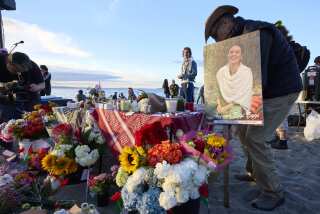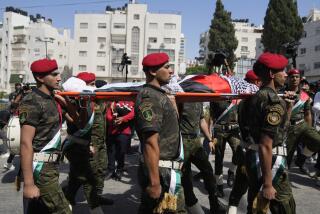Death of an 18-Year-Old Israeli: A Personal Tragedy Turns Political
AL BIRAH, Israeli-Occupied West Bank — Every day does its faithful task and brings us closer to death
And one day only memory is left.
--a poem by Ziva Goldovsky
The place where Ziva Goldovsky was strangled and beaten to death with a stone is a hidden, anonymous spot among flat-topped houses that are scattered on the round hills that surround this little Arab town.
It is not a place where one would expect to find a Jewish woman and Arab man walking together. It is hardly safe anywhere on the West Bank or in the Gaza Strip for casual Jewish travelers.
But Ziva Goldovsky, 18, a slight young woman with weighty political ideas, ignored the dangers and moved among the Arabs as almost no unarmed Israeli does these days. As she would tell Israeli friends, it was her privilege and her right to do so.
One day in mid-August, she paid for her defiance with her life. The exact circumstances of her slaying, it turned out, would immediately be swallowed up in the white-hot political atmosphere of Israel and the Arab lands it occupies. Her tragedy was quickly converted into propaganda, made to fit fixed judgments.
Such a conversion is not unknown here. Last December, an Israeli driving a large truck rammed into a van carrying Arab workers from the Gaza Strip to jobs in Israel. Four Arabs died. A rumor spread in Gaza that the crash was purposeful revenge. Someone had slit the throat of an Israeli businessman in Gaza just days before.
After the truck crash, Arabs began to throw stones at Israeli cars and passers-by. The event that prompted the outrage is all but forgotten; the uprising, known by Arab and Jew alike as the intifada, entered its 12th month a week ago Wednesday.
In April, a group of Israeli hikers were set upon by Arab stone-throwers near the West Bank village of Beita. One of the hikers was armed, shot two Arabs and, mistakenly, a Jewish girl in the Israeli group. Before it was discovered days later exactly who had killed whom, the army entered Beita and blew up 14 houses in retaliation for what they supposed had been an Arab shooting of an Israeli.
And so when Ziva Goldovsky’s body was found, charred in an effort to hide her identity, the search for significance began immediately. Having spent part of her short life looking into means of reconciling Israelis and Arabs, she might have well understood the furor over her death.
Goldovsky belonged to a youth organization of Mapam, a leftist Israeli political party. For a time, she participated in a program called Friendship that brought Jewish and Arab youth together in social settings and seminars. She was considered especially fit for such a program; an immigrant from the Soviet Union eight years earlier, she was open to new ideas in the boiling Israeli political scene, her friends say.
The young woman read philosophy, wrote poetry, learned not only Hebrew but English and kept her friends up late at night with long discussions on socialism and the Arab-Israeli conflict.
In the Friendship seminars, the young Arabs and Israelis ate each other’s food, learned each other’s religion and listened to each other’s points of view. But it was not enough for Goldovsky; the sessions were held exclusively within Israel proper, and she wanted to roam.
“Ziva thought she was immune from danger,” said Dany Peleg, a spokesman for Mapam. “She used to say that people would take care of her, that there was nothing to fear.”
She hitchhiked to and from her home near Tel Aviv to the West Bank, often carrying a purse decorated with hand-drawn Israeli and Palestinian flags. Even when unrest erupted, she would stay to watch, oblivious to the rocks, firebombs and bullets.
Her parents worried. Her father, Yuri, begged his daughter to take care but felt powerless “There was no peace in the house,” he told the newspaper Yediot Aharonot. “We began to live under the fear of death for our daughter. She deserved a father who understood her. I could not understand her and save her.”
Earlier this year, his daughter announced that she would marry an Arab man she had met in Hebron. The parents objected at first; marriage between Jews and Arabs is unacceptable to many on both sides. Later, they acquiesced and offered to find an apartment near Tel Aviv for the pair in order to at least keep their daughter out of harm’s way.
The fiance belonged to a family of refugees. At least one brother belonged to the Palestine Liberation Organization. A sister had once stabbed an Israeli soldier. There were rumors that the father was a petty criminal. The fiance himself was said to deal in hashish and rob houses.
“Ziva thought she could rehabilitate him,” said Peleg. “She believed in the force of good.”
Her betrothed had friends all over the West Bank. Goldovsky visited them as if making routine calls on neighbors. Here in Al Birah, just 10 miles north of Jerusalem, she was seen with a man who may have been one of her fiance’s acquaintances. Arab residents say the man is Khaled Shinni, alternately described as a watermelon salesman, a hashish dealer, a thief, a woman beater, and sometimes all of them.
On Aug. 13, something went wrong. Police later found Goldovsky’s body, along with her purse and keys, buried in an isolated spot near some desolate factories.
The police looked for what are called “nationalistic” motives, a term used to describe an intifada- related killing of an Israeli by an Arab. On Aug. 16, they arrested a suspect, whose name they kept secret, but who Arabs say is Shinni.
Confession Reported
According to the police, the suspect confessed and in his reconstruction of the crime gave an almost textbook account of a political quarrel. He suspected that Goldovsky worked for an Israeli intelligence agency. It was not clear whether he thought she was investigating drugs or anti-Israeli activities. She denied his accusation, he told police.
He demanded that she get a gun for him, he said. The young woman refused and said she would not be a partner in the killing of Jewish children. At that point, the suspect reportedly told police, he killed her in anger.
In an interview, Uri Weiskopf, the chief investigator in the case, admitted that the suspect neither belonged to a terrorist group nor had any known political past.
“Whether it was truly a nationalistic murder will be determined later,” he said.
Newspapers Play Up Killing
Already, it is too late. The English-language Jerusalem Post added Goldovsky’s name to a list of three Israelis killed in the occupied territories since the intifada began. Israel Radio solemnly reported that she had tried to make friends with Arabs but made the wrong ones.
Her case briefly nourished the ongoing debate in Israel as to whether Israelis and Arabs can ever live together in peace.
Hard-liners see the get-togethers of young peace-seeking Arabs and Israelis as something of a social aberration.
“There are plenty of flower children who think they can fix everything by going over and spending the night with Arabs,” said David Bedein, a spokesman for Israeli settlers on the West Bank. “This is what results.”
Goldovsky’s friends and political allies object strongly to the notion that her killing was “Even if at the end we all find out that she was murdered only because she was an Israeli Jew, which I hope won’t happen, it will (nonetheless) encourage us to continue our activities,” the newspaper Hadashot quoted Artzi Halfon, who was associated with Goldovsky in Mapam.
Added Sarit Stern, a high school student: “The first thing I thought when I heard about it was that peace must come quickly.”
Arabs in Al Birah reacted with a defense of the intifada and disdain for the slain young Israeli. Several claimed that Shinni was a well-known delinquent and that if Goldovsky was truly interested in Palestinian views, she could have picked someone less unsavory.
“There are plenty of legitimate Palestinian rebels to meet. Why him?” asked the owner of a hardware store. As for the police report’s reference to a confession of “nationalistic” motives, one Palestinian activist dismissed it as self-serving.
“The murderer wants to look good in prison. No one respects a man who kills a little 18-year-old. He has to make it appear heroic and say she was an intelligence agent. It’s absurd.”
If Israeli authorities believed that it was truly a nationalistic killing, the army would have at least blown up Shinni’s house, he added.
In the end, seven arrests were made, including Goldovsky’s fiance--who, although not linked to the murder, was charged along with four other associates with robbery in nearby Ramallah.
More to Read
Sign up for Essential California
The most important California stories and recommendations in your inbox every morning.
You may occasionally receive promotional content from the Los Angeles Times.










